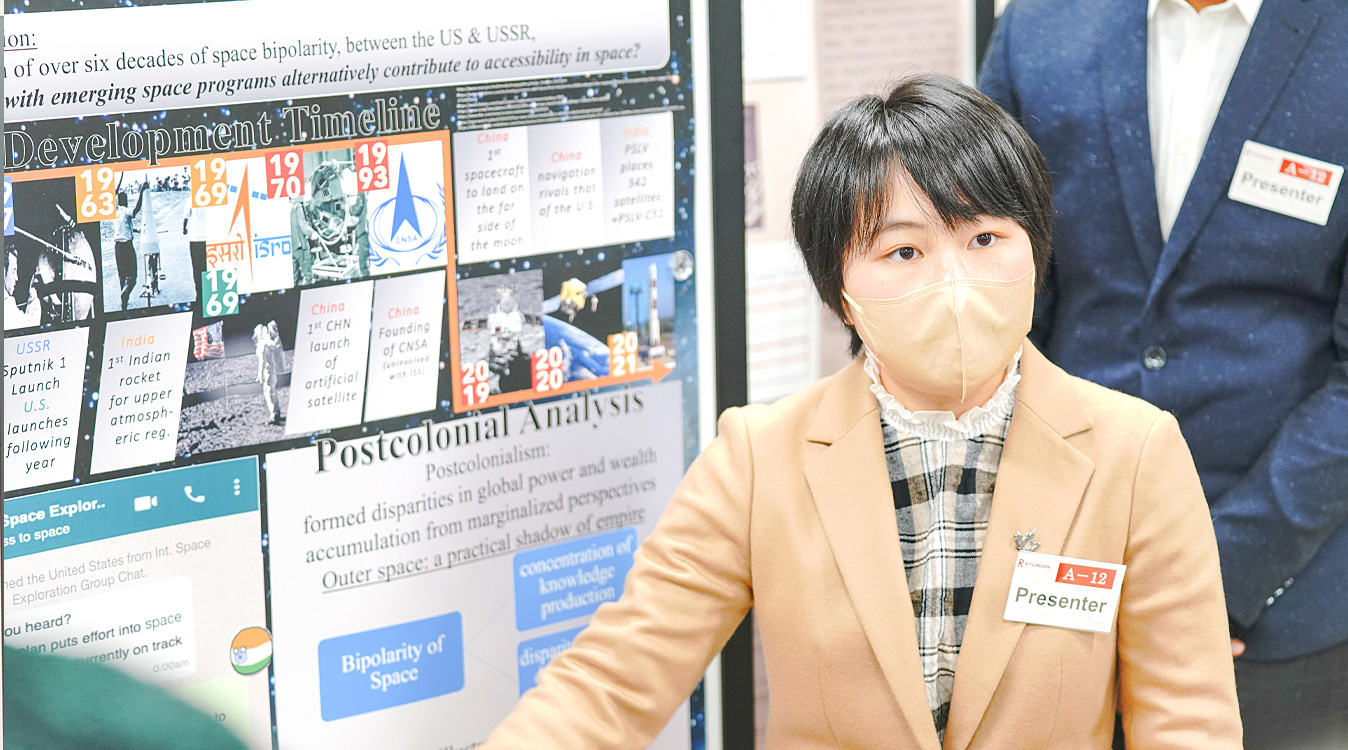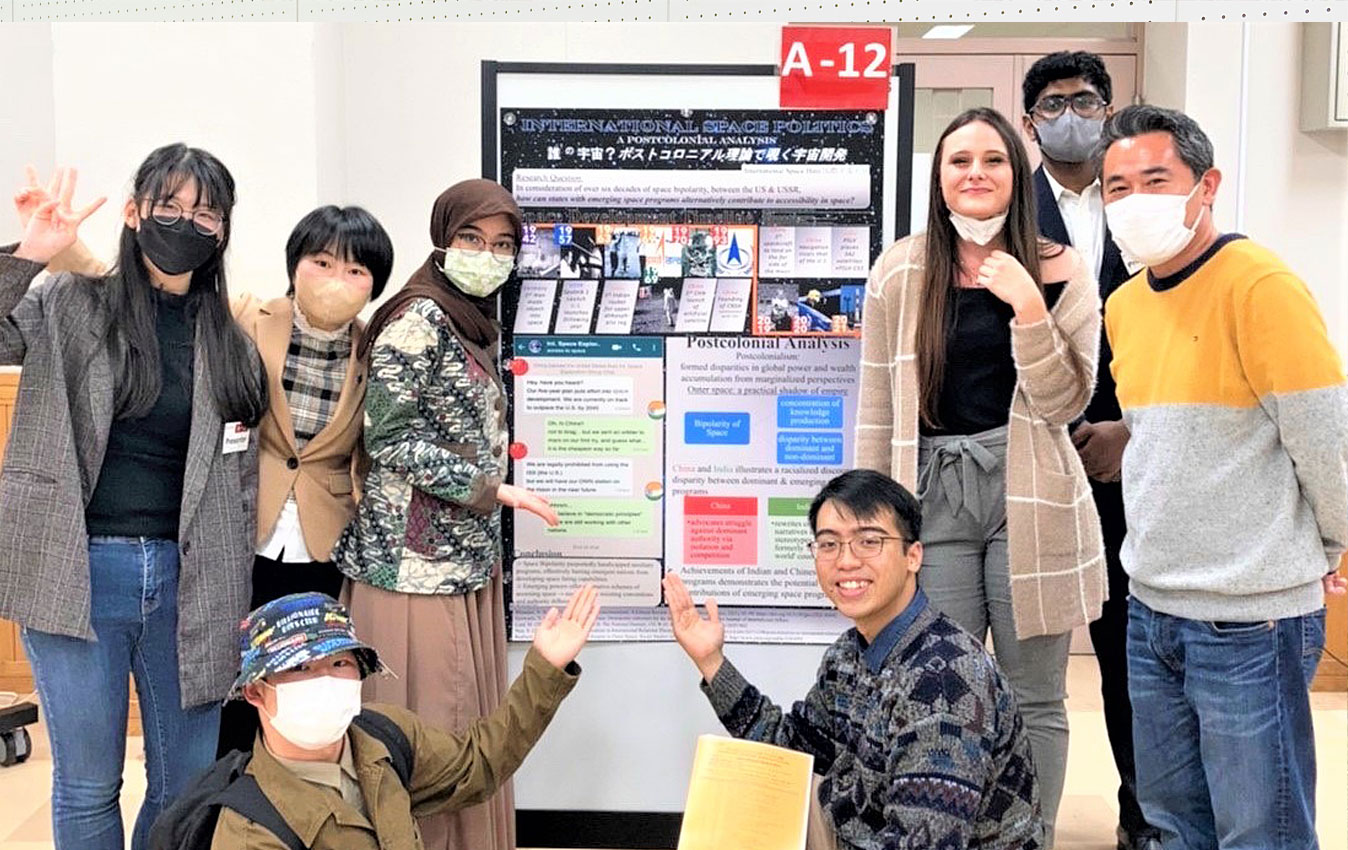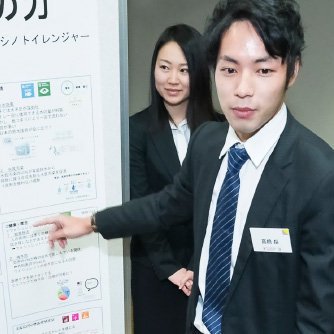Zemi Research Convention 2022
"International Space Politics: a postcolonial analysis"
KANRASU Oseki, HIZUME Ikumi, GOPAKUMAR Sandeep Krishnan, BEAL Sarah, JUNG Haebin, MAHONI Anjani Putri, STEVANI
We interviewed the members of the Ataka seminar (Professor ATAKA Hiroaki), who presented "International Space Politics: a postcolonial analysis" at the 2022 College of International Relations Zemi Research Convention.
Please let us know about your seminar.
Ataka Zemi specializes in Theories of International Relations. They are utilized to better understand and explain international politics and critically approach international issues embedded in global systems. The diversity of academic interests and ethnic backgrounds constituting Ataka Zemi creates engaging in-class discussions, academic debates, and insightful presentations shared among students. The forte of our zemi is discussing and debating about certain topics just like what the old Romans would do. Sometimes we excavate on a topic and come up with a solution or critical thought that one may not imagine thinking of.
We discuss plenty and help each other in our own individual research by providing advice and criticisms from all kinds of perspectives. I find this peer-review system in our seminar very helpful when conducting your own research because, in addition to the instructor’s feedback, your research will gain depth and clarity. This is one core benefit of participating in Ataka Zemi.
Our instructor professor Hiroaki Ataka and we students promote critical thinking and collective learning which is crucial in international relations.
I believe the following messages summarize Ataka Zemi:
- 1. Do not simply take existing knowledge for granted.
- 2. Explore what you are interested in and question everything.
- 3. There is no failure in trying and challenging yourself out of your comfort zone.
That makes one Ataka Zemi student.
Even though Ataka Zemi is known to be one of the most challenging Global Studies seminars, participating in this seminar is like a mock UN. You will meet and discuss with students that have different backgrounds, and perspectives, but in the end, you are still friends with them.
Please let us know about your instructor.
Professor Ataka supports our individual research with detailed feedback at the end of each semester. Together with the reviews from your peers during class, the instructor’s feedback enables your graduation thesis to have depth, clarity, accuracy, and academic appeal. He is a very approachable instructor, so if one has any questions about their research or class discussions, they can easily ask him after class or consult during his office hours. Before and after each class session, our seminar members usually ask questions about anything. That speaks of how approachable he is.
There are no worries for students who find it difficult to participate during class. He moderates class discussions, so that everyone will have the chance to speak their mind and feel included. He entertains any question, answer, or comment. Therefore, one will not feel irrelevant. There is no wrong answer. That is why every seminar member thinks of him as a supportive father figure.
Please give details of your Zemi Research Convention presentation.
Our research project focused on deconstructing the bipolar system of space exploration by highlighting inequalities formed within the existing international system.
Rather than concentrating on prominent programs such as NASA (the United States) and ROSCOSMOS (Russia), emerging national space programs from China (CNSA) and India (ISRO) were the main pillars of our research.
We demonstrated their prospects based on their innovative achievements and analyzed their capabilities under a “power-concentrated” bipolar space system. Specifically, the Indian Space Research Organization offers a cost-effective method of launching rockets into space despite being labeled as a “third world-developing country”. On the other hand, the Chinese Space Agency has emerged as a technological innovator that may surpass organizational predecessors in the international community by 2025.
Overall, the existing system may face inclusive accessibility in the near future from emerging national space programs and even multinational corporations.

Why did you choose your theme?
Our rationale for our topic selection is to find a subject that is (1) unique and eye-catching, (2) engaged politically in international relations, and (3) relatable to a general audience.
Since we use international relations theories (postcolonialism, realism, and liberalism…) to elucidate historical patterns and highlight issues embedded within global systems, we decided that the politically competitive climate of national space exploration programs and their respective space projects would be worth delving into. Through critical approaches and theories, our team questions the bipolar international structure orbiting national space programs.
What questions and comments did you receive at the Zemi Research Convention, and which made the most impact on your group?
Although our research scope focused on state-to-state relations, some questions mentioned the significant roles of corporations and companies in supporting national space programs or launching their space projects. This convinced the audience of the academic prospects in our research topic.
It was both entertaining and amusing to see the audience enjoy discussing with the presenters and vice versa. I believe the training we experienced in in-class discussions and debates made each presenter intelligible and engaging to each person in the audience.
What kind of things did you experience as a group leading up to the convention?
Since we have members with different nationalities and backgrounds, we struggled in compiling various interesting ideas and opinions into one unified research project. Nevertheless, we enjoyed the process of exchanging creative and novel ideas with each member. I learned plenty from my fellow classmates. As the one organizing the team, I put effort and time into listening to each voice in the team while arranging an “easy to communicate” environment.
What did you learn through the Zemi Research Convention you can apply to your future career?
Despite the difficulties we encountered during the preparation process, I learned the importance of team building, transparent communication, and team management when tackling team-based projects. I hope to utilize this acquired experience and knowledge in the future to support those whom I will cooperate with in achieving a certain goal.
Message to the next year's participants.
IR research can be anything. You can be creative, you can be unique, and you can be anything you want.
Challenging yourself in a global and diverse space is the epitome of studying international relations. There is no need to be intimidated, Ataka Zemi and any other seminars are very engaging and supportive. Take your time to select what seminar suits you best. Good Luck and enjoy this time of your college life.
Also, we strongly encourage Japanese students to participate in English presentations!!

February 2023
MORE INTERVIEWS
-
Bridging Japan and the US through International Relations and Language – My Four Years in the JDP and My Global Future
INADA Mimi
Fourth-year Joint Degree Program (RU-home)2025.2.25
studentlife|academics|studyabroad|jdp|
-
While technical knowledge and job-required skills can be learnt after being on the job, some skills, such as communication, presentation, data analysis, and visualization, are the skills I was able to learn from my time at Ritsumeikan.
Pranjal Modi
RIMOWA (Global Studies Major Alumnus 2022)2025.2.4
alumni|
-
Zemi Research Convention 2024“The Integration of Human Rights into International Environmental Law and its Implications”
Ochi Seminar
(team name: Environmental Justice Analysts)2025.1.6
academics|openseminar|
-
Zemi Research Convention 2024“Are Israel's actions in Palestine considered self-defence”
Ochi Seminar
(team name: The Prosecutors)2024.12.25
academics|openseminar|
-
This supportive community empowers you to step out of your comfort zone and take on numerous challenges throughout your university life.
SUZUKI Tomoya
SAP (International Relations Major Alumnus 2018)2024.12.11
alumni|
-
Surrounded by diversified nationalities of colleagues and external business relationships, this was essentially similar to what I experienced while studying in the College of International Relations.
Joyce Lo
Mindshare (Global Studies Major Alumnus 2017)2024.12.10
alumni|
